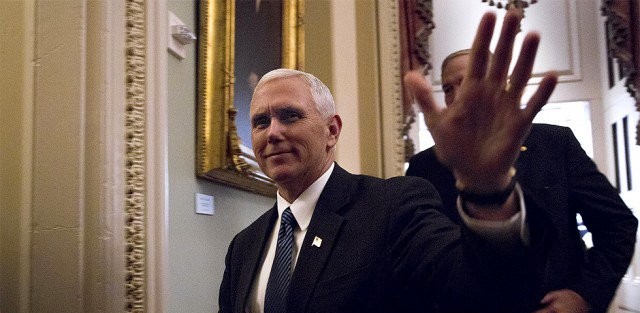Vice President Pence pitches Administration proposal in 2-hour meeting with legislators
Developments on Day 75 of the Trump Administration:
Administration Struggles With Revival of Healthcare Bill
A White House offensive is struggling to resurrect the GOP’s healthcare bill, withdrawn on March 24 just before a vote in the House of Representatives.
Both Republican conservative and moderates gave a cautious reception on Tuesday to the approaches from Vice President Mike Pence and other top administration officials.
The Administration is offering to let states request federal exemptions from insurance coverage requirements under ObamaCare. About two dozen top GOP lawmakers met for two hours Tuesday evening with Pence and senior officials, but participants said differences remained over giving states flexibility to drop mandates.
“It was a very good exchange of ideas, with concerns that represent the very broad spectrum of our conference,” said Representative Mark Meadows, the leader of the conservative Freedom Caucus whose opposition helped doom the initial GOP bill.
But moderate Frank LoBiondo and conservative Mo Brooks each said they remained “no” votes, with Brooks saying states should be allowed to opt out of Obama’s insurance requirements without seeking federal permission.
Jim Renacci was among several moderates warning that a quick vote would be counter-productive.
“We want to make sure that when we go, we have the votes to pass this bill,” House Speaker Paul Ryan told reporters. He said talks were in “the conceptual stage” and would not predict a vote before Congress soon adjourns for a two-week Easter recess.
Later in the day, Representative Steve Scalise, the GOP’s chief vote counter, said talks were not at “a place where there is consensus” on health care.
Pence maintained that he and President Donald Trump “remain confident that working with the Congress we will repeal and replace Obamacare”.
Under the White House proposal, states can apply for a federal waiver from a provision in Obama’s statute obliging insurers to cover “essential health benefits”, including mental health, maternity and substance abuse services. The initial version of the GOP bill — after a Trump concession to conservatives — eliminated the coverage requirement but let states reimpose it themselves, an arrangement that is opposed by many GOP moderates.
The White House would let states seek an exemption to the law’s provision banning insurers from charging higher premiums for seriously ill people.
How Trump’s Rhetoric and Travel Ban Cut Off Kushner’s Engagement with Muslims
Donald Trump’s “Muslim Ban” on travel to the US cut off an attempt by his son-law and senior adviser, Jared Kushner, at engagement with American Muslim activists and businessmen.
Kushner met the group in New York in January, before the inauguration, at a site away from Trump Tower, according to six of the participants. The session included a prominent imam, a civil rights attorney, the director of a nonprofit that studies violent extremism, and two venture capitalists — one of whom is a partner at Thrive Capital, the firm run by Kushner’s brother, Joshua.
Kushner asked for ideas on how to improve Trump’s relations with Muslims and assured the participants that they were not be targeted by Administration because the threat was overseas with “the cancer” of radical Islam. The advisor even asked the meeting to recommend candidates for jobs in the administration, including the White House liaison to Muslim communities, a post that was not expected to be retained by the White House.
However, the effort was superseded by Trump’s rhetoric and the executive orders, held up by federal courts, trying to bar visas to citizens of six mainly-Muslim countries and to ban all refugees.
“We thought discussing our nation’s founding values and freedom for Americans of all faiths was the responsible thing to do before Mr. Trump came to power,” Muslim Advocates Executive Director Farhana Khera, who was in the meeting, said. “It soon became clear, however, that unless Trump makes drastic changes and shows he’s committed to being a president for all Americans, engagement is not an effective tool at this stage.”
Muslims’ access to the White House is restricted to a back channel run by Kushner. Meanwhile, a prominent Islamophobe, Brigitte Gabriel, the founder of ACT for America, was welcomed by Trump advisors on March 21.
“As far as I’m concerned, if that’s the kind of engagement happening, there’s no engagement. It doesn’t count,” said Wa’el Alzayat, executive director of EmergeUSA.
Trump Promises $1 Trillion for Infrastructure, Offers No Details
Donald Trump repeats his pledge to spend more than $1 trillion on infrastructure such as roads, tunnels, and bridges, but offers no details.
Trump told a White House meeting of 50 chief executives and other business leaders that he would cut red tape to speed up approval of projects.
Transportation Secretary Elaine Chao said at the forum that the administration plans to propose a legislative package in May.
Border Arrests at Lowest Point since 2012
Arrests of people crossing the border illegally dropped about 44% in February, reaching their lowest point since 2012, according to Homeland Security data.
The Border Patrol reported that about 23,500 people were arrested in February, compared to about 42,500 in January.
The reason for the decline is not clear, although Homeland Security chief John Kelly credited Donald Trump’s proposal for a US-Mexico border wall, the announced hiring of thousands of immigration agents, and a crackdown on undocumented immigrants living in the US.
Mexican Foreign Minister Luis Videgaray rejected Kelly’s comments:
“A figure for one month cannot be analyzed as if it was a trend. We will be able to have an opinion if this figure becomes a trend over the next months. Today is just a figure of a specific month.

